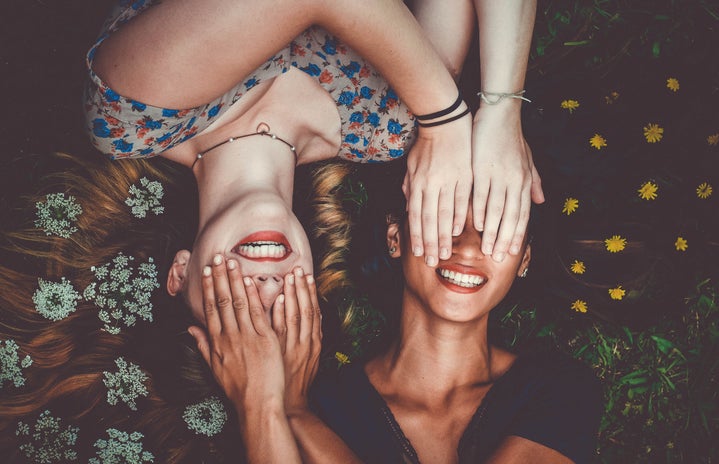Watching Meghan Markle disappear up the stairs of St George’s Chapel last June, I felt an overwhelming sense of pride. Why, you ask? Not because she is the first African American woman to become British Royalty; and not because she chose a French designer, Givenchy, for her marriage into the most ‘English’ of families; and not because she clearly can’t help but make Prince Harry split into that toothy grin we all know and love, but because she is a harbinger of change.
Poker Faces: Scandal, Seduction and Sadness
Despite bringing in the frankly outlandish annual sum of £1.8 billion into the British economy, the Windsors have not always been the ‘people’s choice’. In 1997, as thousands wept for the death of the young Princes’ mother, Diana, Princess of Wales, vicious rumours began to swirl.
After her divorce from Prince Charles, the year preceding her death, Diana gave a very public interview condemning many of the outdated rules, and ideas of the monarchy, even exposing both her affair with riding instructor James Hewitt, and her husband’s continuing adultery with the current Duchess of Cornwall, Camilla Parker-Bowles. Having never been close to the Queen and Prince Charles’ immediate family, Diana had become something of an ‘anti-monarchy’, one that shook hands with AIDs sufferers, walked among landmines, and partied with the ‘common’ people. She flirted with what many might call the identity of a thoroughly modern, people’s princess.
In shock, the nation began to question the role of the monarchy in both Charles and Diana’s divorce, and most shockingly, in her untimely death. Once an a-political presence, serving the realm as a figurehead of public pride and international acclaim, the monarchy, like falling in a lake whilst black-out drunk, was plunged crown-first into denial, secrecy, and deep sadness for the Princes and their family.
The inescapable scandal, intrusion and public presence that perpetrates the lives of the Royals cannot be undone, it seems. For hundreds of years, this has been the case. Elizabeth II’s uncle, Edward, Duke of York was forced to abdicate in order to marry a divorced woman. Elizabeth I was also hounded throughout her reign to marry, and give over political control of England to her husband and heirs- what kind of life is that? And after the civil war, when the monarchy receded much of its political influence to Parliament, many believed, and still do, that the Royal family became an outdated, ‘play family’, a knick-knack for journalists to toy with, and a mere figurehead that refused to move with the times.
However, I do not believe this is the case, and certainly not the way the monarchy is heading.
Cards Close to Her Chest: The Queen and Politics
Though she is not allowed to vote, the Queen still holds a great deal of political influence. She meets with the Prime Minister weekly, and approves all new laws and concessions that are made in the Houses of Parliament. She meets with foreign dignitaries and political leaders. Most recently, Princes William, Harry and Charles refused to meet with Donald Trump on his State visit. If that isn’t a political statement of strength and support for the integrity of the UK, I don’t know what is.
Just watching Netflix’s brilliant show, The Crown, (yes, I do want to be Vanessa Kirkby), you can see the struggle of the monarchy to shape, change and adapt. At one point, the queen Mother, played by Vanessa Hamilton mourns the loss of a certain kind of royalty: “And so it goes. The stings and bites we suffer as it slips away. […] Our authority, our absolutism, our divine rights. […] Protocol and precedents, the last scraps of armour as we go from ruling, to reigning, to being nothing at all.”
A Royal family that have many times snubbed modernisation for tradition, the Windsors seemed in desperate need of a shake up.
Playing An Ace – The New Generation: Enter Stage Left.
With the advent of a new kind of personal monarchy, Princes William and Harry have captured the hearts of a nation. Both serving active terms in the army, with Harry in action in Afghanistan, and William in a paid job as a military helicopter pilot, it is in no doubt that the people’s Princes are upon us. Both Princes have spoken openly about their struggles with loss, grieving, and mental health, even starting up their own charities under The Royal Foundation, continuing a lot of the work of their late mother, Diana. This kind of intimate view into, and connection with the Royals is a step towards an inclusive ‘people’s monarchy’.
Harry and William’s respective weddings, neither one among the British aristocracy, were watched by around 29 million people globally. Kate, an activist herself, joins William in being a force for social change, heading up the Heads Together movement, and visiting schools across the country to make those suffering feel less alone. Meghan Markle, herself a divorcee, a fact that caused social uproar when Princess Margaret previously endeavored to marry Peter Townsend, is an American actress with links to charities throughout the world, a premise that she and Harry instantly connected on.
A passive Royal family? I think not.
All in favour of a Royal Flush, raise your hands. I certainly will.


